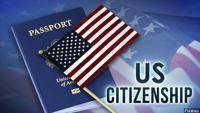(WSIL) �� The Trump administration is making it more difficult for the children of some U.S. service members and US government employees living abroad to automatically become US citizens, according to a released Wednesday by U.S. Citizenship and Immigration Services (USCIS).
The rule appears to primarily impact the children of naturalized U.S. citizens serving in the armed forces who have not lived in the U.S. for a required period of time. It does not impact anyone born in the United States.
U.S. citizenship can be acquired a few ways, including being born in the country. Children born abroad can acquire citizenship through their U.S. citizen parents either at birth or before the age of 18.
Department of Defense spokeswoman Lt. Col. Carla M. Gleason said in a statement that the department worked closely with USCIS and "understands the estimated impact of this particular change is small."
"However, we are committed to ensuring affected families are provided the appropriate information, resources, and support during this transition," Gleason said.
The policy manual update is highly technical and contradicts parts of an 11-page memo the agency initially put out that implied American citizens were among those whose children would no longer be automatically granted citizenship if born abroad.
While the latest policy guidance doesn’t make anyone ineligible for citizenship, it appears to narrow how children abroad can gain citizenship.
"The policy change explains that we will not consider children who live abroad with their parents to be residing in the United States even if their parents are U.S. government employees or U.S. service members stationed outside of the United States, and as a result, these children will no longer be considered to have acquired citizenship automatically," said a USCIS spokesperson, referring to a section of the immigration code about residence.
The policy change is yet another roadblock that the administration of President Donald Trump has placed for people to live legally in the United States, said immigration attorney Martin W. Lester, who is based in Tennessee and who serves on the military assistance committee of the American Immigration Lawyers Association.
Acting USCIS Director Ken Cuccinelli said on Twitter, however, that the policy "does NOT impact birthright citizenship."
Here’s the statement I promised (1/3):
The policy manual update today does not affect who is born a U.S. citizen, period. It only affects children who were born outside the US and were not US citizens. This does NOT impact birthright citizenship.�� USCIS Acting Director Ken Cuccinelli (@USCISCuccinelli)
The policy appears to target children of service members who are legal permanent residents and not U.S. citizens, but could also affect citizens if they can’t prove they lived in the U.S. for a certain amount of time. People in those scenarios would have to undergo a more cumbersome process for obtaining American citizenship for their kids.
"It’s gonna take time, money, it’s gonna cause stress. There’s gonna be some people whose kids aren’t gonna qualify and that’s gonna cause a huge problem," Lester said.
Immigrant advocates have said the Trump administration has unfairly treated members of the military who aren’t American citizens. The AP reported last year that the Army was quietly and abruptly discharging soldiers who enlisted through a special recruitment program that promised a path to citizenship.
The guidance comes just days after President Donald Trump said he was "seriously" considering ending US birthright citizenship.
The policy change will take effect on October 29.
The Associated Press and CNN contributed to this report.














